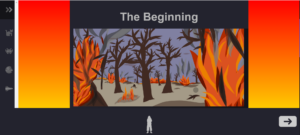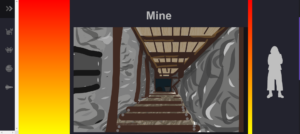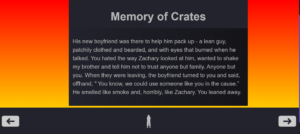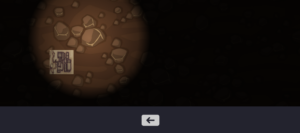
This past semester, Professors Gabrielle Calvocoressi and Courtney Rivard successfully navigated the limitations of the pandemic to create an innovative and collaborative online classroom. The parallel-taught courses, Rivard’s ENGL 118: Storytelling and Game Development and Calvocoressi’s ENGL 307: Poetry Stylistics, worked together to bridge poetics and gaming, resulting in student-created games that experimented with modes of storytelling and made the most of open-source game-making software.
The idea to bring together a poetry and a game design course originally came as a result of Digital Literacy and Communications Lab’s Gaming Initiative. In September 2019, the Digital Literacy and Communications Lab was awarded the Center for Faculty Excellence/Lenovo Instructional Innovation Grant for the development of the Greenlaw Gameroom. Through the grant, the Greenlaw 316 classroom was outfitted with consoles, video games, audio equipment, and five large LCD screens. Unfortunately, the Gameroom only hosted a few classes before the campus shut down in spring 2020 amid the COVID-19 pandemic.
Instead of being able to use the Gameroom for their classes, Calvocoressi and Rivard worked to foster collaboration across online classes virtually:
“We wanted to create a collaborative space to bring together students from different disciplines with different perceived strengths and interests to rigorously explore the way ‘play’ can bring us to a deeper understanding of poetic forms and digital programming. We aimed to do this by using an approach known as parallel teaching where two classes come together to learn in the same space…Our goal was to foreground notions of play in all its different forms and iterations to interrogate what it means to play a game and how reframing a discussion of poetic craft around play could open us to different possibilities around equity, accessibility and experiment,” says Calvocoressi and Rivard.
One student who brought a different discipline to the English course was Noah MacFarlane. Throughout the course, he was able to use his computer science background to help build his group’s game, while also learning novel literary aspects of gaming:
“I do love being a computer science major, but this class really let me explore the world of game development and exercise some creativity that I don’t really get the chance to in some of my other classes. For me, [the course] transformed my view of games from a mostly mechanical medium to a literary medium where every game had a theme and meaning, whether it was intended to or not. To be able to explore the structure of games for myself, discuss those elements, and try my own hand at it has really given me an extraordinary view for games and showed me possibilities that I didn’t know existed.”

As for the collaborative nature of the course, students found that working together and across classes was not only vital to their projects, but even something to look forward to in the otherwise isolated, virtual social world of the pandemic.
“This class was one I looked forward to going to; even though it was over Zoom which was fatiguing, entering a space of such creativity, exploration, and collaboration with people made me feel more connected to myself, my emotions, and other people,” says student Molly Hanna.
MacFarlane felt similarly: “I usually despise group projects. But in this class, I feel like there was a certain passion coming from the students about their projects. This was their project, their story, their game. The ability to collaborate with others wasn’t a drag, it was beautiful. Everyone expanding upon each other’s ideas and putting forth their strengths made the game bigger than what it could’ve been with only one mind. For me it was an amazing process and I wish I could do it again.”

The success of the collaboration going virtual is something Calvocoressi and Rivard built into the classes’ very structure:
“Each week we would learn a new aspect of poetry and game design and then play digital games together as class. The games provided an additional way for students to inhabit new characters and environments as well as create community through the common experience of game play. Then for the last 5 weeks of the semester, students worked in groups to create their own game with an open-source program called Twine that featured the form of poetry known as Haibun. The games were absolutely amazing as they pushed the boundaries of both the form of the Haibun and Twine.”
MacFarlane and Hanna worked together on the same game, Underdepth. MacFarlane says that the game has “an immersive story and a beautiful user interface, [where] the user was still able to experience some challenge and feel agency as they walked through the world my group created and the satisfaction of finding the best ending if they so choose.”

“[Underdepth] developed out of the idea of having to migrate underground due to the climate crisis,” and explored, “memory and decision-making with consequences based on the decisions made…Making the game was loosely structured with the idea of escaping a climate crisis and searching for a loved one while allowing for free-flowing creativity in our world-building through sensory exploration within the Renga poem,” says Hanna.
Despite the course’s pivot from utilizing the Greenlaw Gameroom to a completely virtual format, Calvocoressi, Rivard, and their students found that learning virtually allowed them plenty of play and collaboration among their poetry, game design, and classrooms.
“In the end,” says Calvocoressi and Rivard, “we feel so honored to have been a part of this community of students who worked so hard to create a space of collaboration and inclusion through games and game play, which ultimately created a space of possibility and fun in the midst of such a difficult time in the world.”
Check out Underdepth here!

